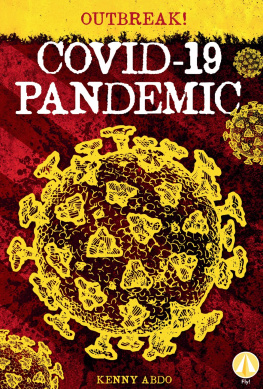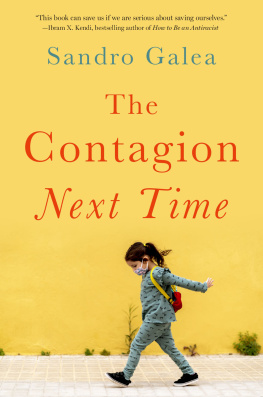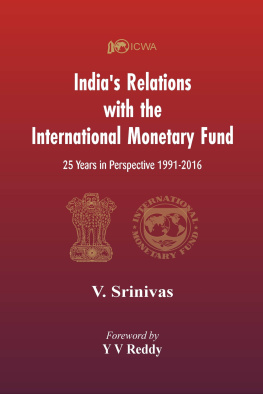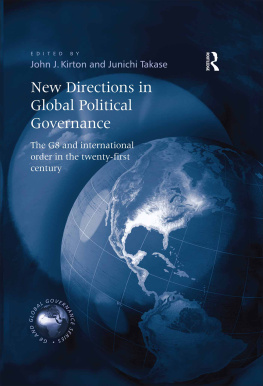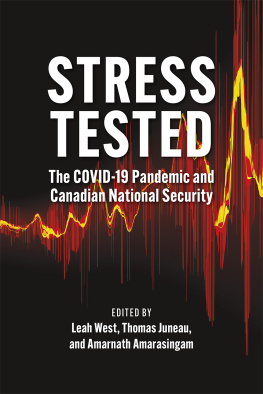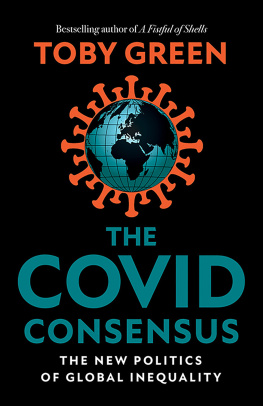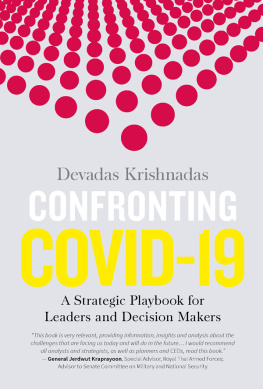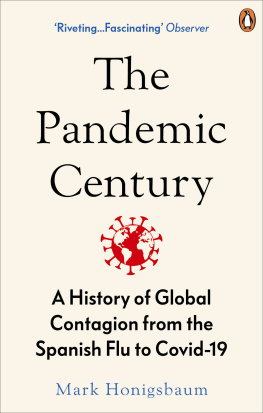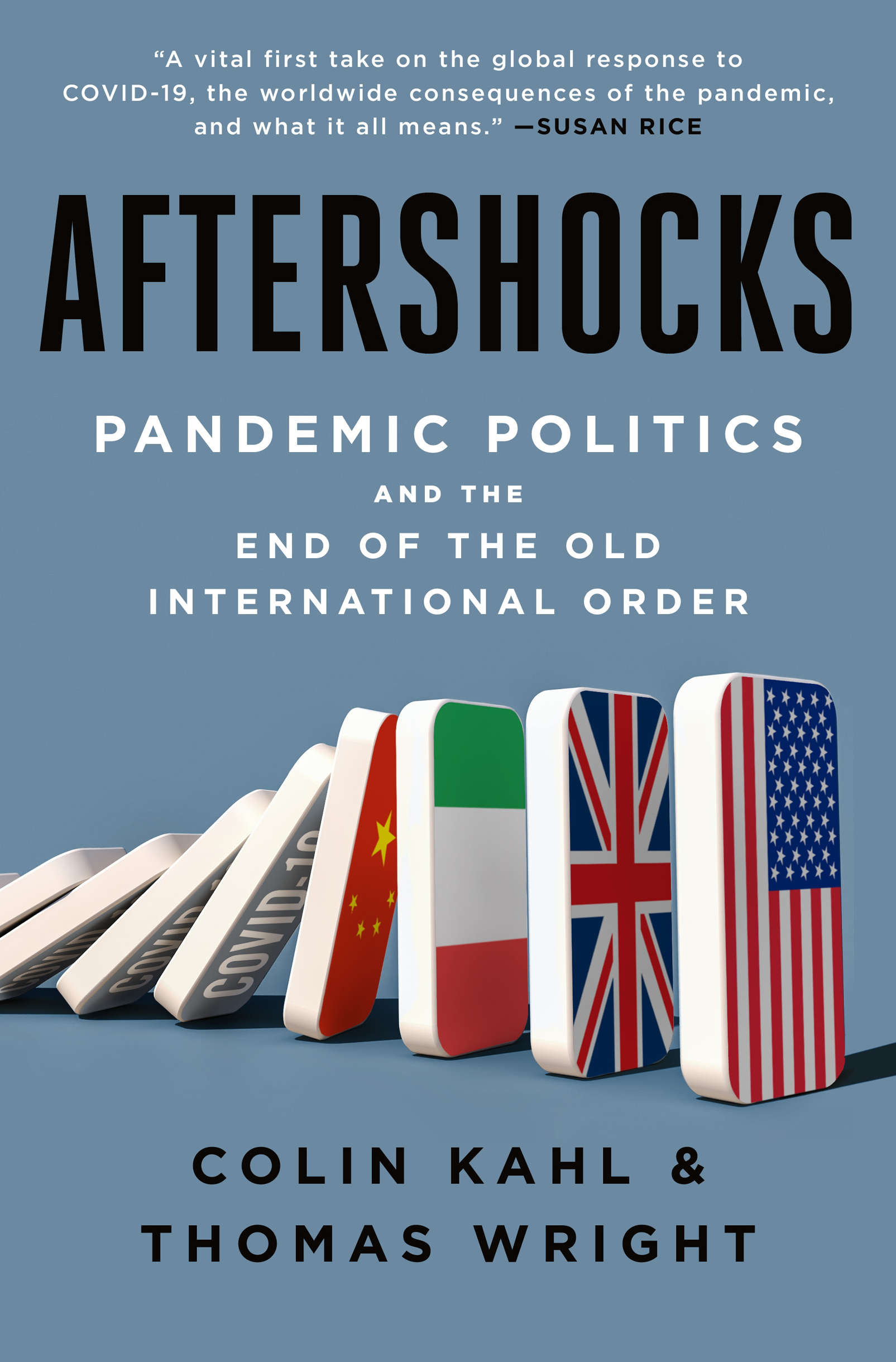Contents
Guide
Pagebreaks of the print version

The author and publisher have provided this e-book to you for your personal use only. You may not make this e-book publicly available in any way. Copyright infringement is against the law. If you believe the copy of this e-book you are reading infringes on the authors copyright, please notify the publisher at: us.macmillanusa.com/piracy.
Colin dedicates this book to Rebecca, Nora, and Rylan.
Tom dedicates this book to Karen and Senan.
In researching this book, we conducted over sixty interviews with senior officials from the United States, Europe, Asia, Australia, Israel, and the World Health Organization. Most of these interviews were conducted on background, meaning that we could use the information and quote the source directly but not attribute it to them by name without prior approval. Given the politically sensitive nature of many of our conversations, this was necessary to get as full and frank a picture as possible. Throughout the book, wherever we say an official told us something or that a specific official said or thought something, and no citation to another work is provided, it came from one of these interviews. In each case where we use information from one of these interviews, the official had direct knowledge of the events being discussed. In most instances, we do not provide endnotes referencing interviews conducted for the book; we only do so when the source of the information is not otherwise clear from the text.
Donald Trump was a natural unilateralist. He was elected on an America First platform that rejected seventy years of U.S. global leadership and viewed alliances, treaties, and trade deals as attempts by the rest of the world to trick the United States out of its money and power. Nevertheless, his core team understood earlyin fact, earlier than European governmentsthat the novel coronavirus that emerged in Wuhan, China, in December 2019 could be a game-changer, a national security challenge that would define his presidency. But it took weeks to get Trumps attention. After what felt like an eternity, on January 31, 2020, Trumps national security and health teams convinced him to take action by banning travel from China. It was an important, though insufficient, stepthe ban still allowed tens of thousands of Americans and others from China to fly back to the United States, which would require a significant program of testing and contact tracing that was never put in place. Crucially, the virus was already circulating in America.
The next day, Robert OBrien, the U.S. national security advisor, began asking other countries to follow suit. The virus could be contained only if everyone acted swiftly, but was it already too late? The Australians had barred travel from China and the Japanese were on board. But OBrien was frustrated with the Europeans. Each capital refused to move individually; they preferred a united response by the whole of the European Union (EU), and that was unlikely, especially since many European governments were wary about alienating Beijing. As the virus took hold in Italy, OBrien tried to convince European national security advisors to impose travel restrictions within the Schengen Area, a free-travel area encompassing twenty-six countries, but they would have none of it. In Washington, OBrien and his deputy, Matthew Pottinger, pushed the president to make a case for an international response to the pandemic, but Trump was unpersuaded. Why arent the Europeans doing anything? he fired back. That was the moment, some administration officials felt, when the opportunity for allies to work multilaterally on an unfolding and potentially unprecedented crisis evaporated.
From the time Trump first heard of the dangers posed by the virus, his instinct was to minimize it. He had just signed a trade pact with China and was eager to portray himself as the dealmaker in chief in advance of his reelection bid in November. His opponents described him as a warmonger, but he hoped to roll out a number of agreements with foreign leaders. It would show that he was a tough operator who was fiery and furious in negotiations but also could close the deal. For example, Trump seemed to push the United States to the brink of nuclear war with North Korea in 2017, only to pull back and hold three made-for-TV meetings in 2018 and 2019 with the countrys dictatorial leader, Kim Jong-un. It was mostly for showbut for Trump that was all that really mattered. In early 2020, the American economy was going strong, and the president worried about any action that would derail its progress. The travel ban was action enough, he believed, and everything was under control. That is what Chinas president, Xi Jinping, was telling him in a number of phone calls. But both the emerging pandemic and the economy were about to get much, much worse.
In early March, the markets went into free fall. The contagionnow known as COVID-19, shorthand for coronavirus disease 2019was spreading across Europe. Trumps advisors warned that millions could die if he took no further action. So on March 11, Trump reluctantly agreed to shut the economy down for three weeks. It may not have been enough, but it was a start. For more than a month, OBrien, Pottinger, and the administrations health advisors had struggled to convince the president that this was serious. But now the dam was breaking, and a national crisis loomed. Trump quickly turned on China (one of his favorite rhetorical targets, despite his warm personal relationship with Xi). His message to his aides was blunt: These guys have fucked us and they fucked me personally. He began to call the pandemic the China virus. In response, Beijing started to sow rumors that the U.S. Army had brought the virus to Wuhan. Trump had another phone call with Xi on March 26; this one was contentious, as they argued about the origins of COVID-19. For the remainder of Trumps term, the two men would not speak again.
By late March, all the worlds wealthiest democracies were in lockdown, facing what appeared to be their most severe crisis since World War II. No one knew what the ultimate death toll could be, but a rough back-of-the-envelope calculation was terrifying. The U.S. Centers for Disease Control and Prevention (CDC) estimated that up to 1.7 million Americans could die. German officials worried that they could lose half a million people. Everyone had known some sort of global pandemic was possible; some countries had even planned for it. But now that one had arrived, many leaders were flying blind. To curb the spread, economies were deliberately shut down, but that triggered an unimaginable worldwide recession that rivaled that of the Great Depression of the 1930s (or so it seemed for a while). Each country, in its own way, worried that its population was not prepared, psychologically or materially, for what was about to happen.
International cooperation was effectively at a standstill. The World Health Organization (WHO), stymied by insufficient cooperation from China and overly deferential to Beijing, struggled to understand the evolving nature of the pandemic. As a result, it also found it difficult to offer coherent advice on how to contain it. Around the world, a competitive, self-help logic dominated national responses. Germany closed its borders, stranding thousands of its citizens who were abroad and could not return home. French authorities seized 6 million protective masks from a Swedish-owned distribution center in Lyon to prevent the masks from being exported to other European countries. Italian leaders warned that the crisis could break the European Union. The United States gained a reputation as a big spender, persuading medical suppliers around the world to divert to America shipments that had already been promised to other nations. In Asia, Japan and other nations struggled to comprehend how to care for thousands of passengers on infected cruise ships afloat in the Pacific.


